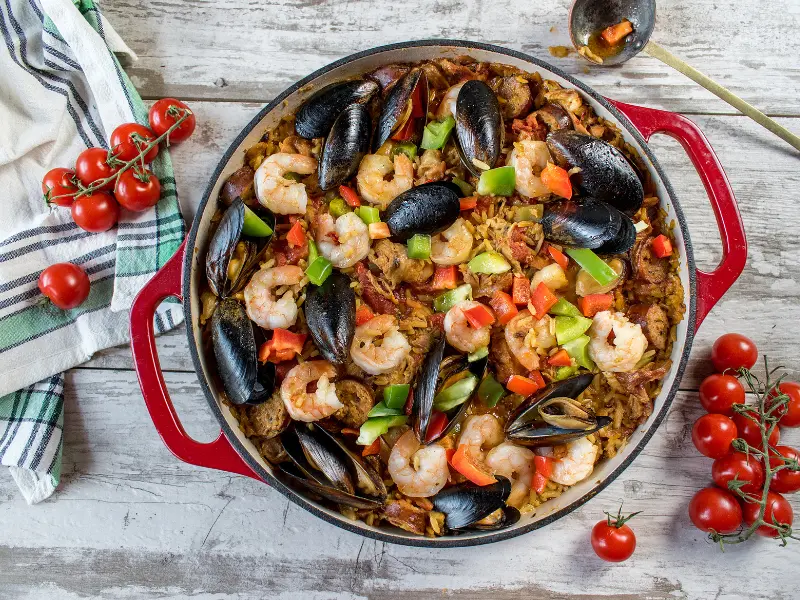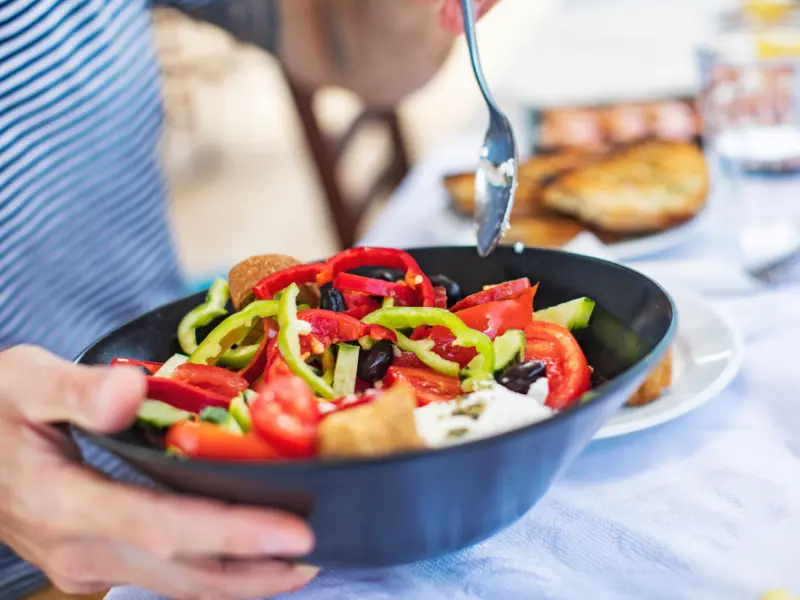The Mediterranean diet has become popular as a healthy and practical weight loss approach. Originating from the Mediterranean region, this diet is based on the traditional eating patterns of people living in countries like Greece, Italy, and Spain.
In this blog post, we will delve into the details of the Mediterranean diet and how it can help you lose weight while improving your overall health.
What is the Mediterranean Diet?
The Mediterranean diet is a plant-based eating pattern emphasizing whole grains, fruits, vegetables, nuts, and legumes. It also includes moderate amounts of fish and seafood, poultry, and dairy products like Greek yogurt and cheese.
The Mediterranean Diet For Weight Loss
One of the main reasons why the Mediterranean diet is effective for weight loss is because it focuses on whole, unprocessed foods. These foods are high in nutrients and fiber, which help keep you full and satisfied for extended periods, reducing the chances of overeating.
The Health Benefits of the Mediterranean Diet
Apart from its weight loss benefits, the Mediterranean diet offers a wide range of health benefits.
It Can Keep Your Heart Healthy
The Mediterranean diet contains healthy fats like olive oil, nuts, and fatty fish. These fats help lower LDL (bad) cholesterol levels and increase HDL (good) cholesterol levels, reducing the risk of heart disease.
It Can Help Control Blood Sugar Levels

The high fiber content of whole grains and legumes in this diet can slow down the absorption of sugar, preventing spikes in blood sugar levels. This makes the Mediterranean diet suitable for people with diabetes or those at risk of developing it.
It Can Improve Brain Health
The Mediterranean diet is rich in omega-3 fatty acids for brain function and development. Studies have shown that this diet can reduce the risk of cognitive decline and Alzheimer’s disease.
Longevity and Wellness
Research has found that the Mediterranean diet can increase lifespan and improve overall wellness. This diet’s high consumption of plant-based foods, antioxidants, and healthy fats is linked to lower rates of chronic diseases like cancer, diabetes, and obesity.
Mediterranean Diet Foods
To fully benefit from the Mediterranean diet, it is essential to familiarize yourself with its food items. Foods that make up the Mediterranean diet include:
Whole Grains
Whole grains like brown rice, quinoa, and whole wheat pasta are staples in the Mediterranean diet. These complex carbohydrates take longer to digest, keeping you feeling full and preventing blood sugar spikes.
Healthy Fats
The Mediterranean diet is rich in healthy fats like olive oil, avocados, and nuts. These fats are essential for proper functioning and can help reduce inflammation and cholesterol levels. Consuming healthy fats also helps keep cravings at bay, making it easier to stick to a healthy eating pattern.
Fish and Seafood

The beautiful Mediterranean Sea surrounds the Mediterranean region, so it’s no surprise that fish and seafood are essential to this diet. These protein-rich foods provide vital nutrients like omega-3 fatty acids, linked to weight loss and improved heart health.
Fruits and vegetables
The Mediterranean diet incorporates a variety of fruits and vegetables in every meal. Research has shown that a vegetable-rich diet can effectively prevent weight gain or promote weight loss.
By including a variety of vegetables in your meals, you can benefit from their low-calorie and nutrient-dense nature, which can help to create a feeling of fullness while providing essential vitamins, minerals, and antioxidants.
Nuts and legumes
Nuts and legumes are another significant component of the Mediterranean diet. They are rich in protein, healthy fats, and fiber, making them a perfect snack for weight loss.
Dairy and Cheese
Dairy and cheese, in moderation, are allowed in the Mediterranean diet. However, choosing low-fat options like Greek yogurt and feta cheese is essential.
A Healthy Lifestyle
The Mediterranean diet is more than just a list of foods to consume; it’s also a lifestyle. It encourages regular physical activity and social interaction, which is essential for maintaining a healthy weight and overall well-being.
Interacting with others
Interacting with others forms an integral part of the Mediterranean lifestyle. It is a key component of mental and physical health. The Mediterranean culture values community and family bonds, social gatherings, and shared meals. This social interaction can lower stress and anxiety levels, contributing to a healthier lifestyle.
Physical Activity

Physical activity holds a central position in the Mediterranean lifestyle. The Mediterranean region’s inhabitants traditionally engaged in plenty of physical labor, such as farming, fishing, and herding, which kept them naturally active.
Even today, daily physical activity such as walking or cycling is common among Mediterranean populations. This active lifestyle helps burn calories, thereby supporting weight loss and preventing weight gain, but also promotes cardiovascular health, improves mood and energy levels, and aids in stress management.
Additionally, regular physical activity can enhance the benefits of the nutrient-dense Mediterranean diet, creating a synergistic effect for a healthier lifestyle.
For the Mediterranean, maintaining a balance between what you eat and how you move is integral to overall health and well-being.
Mealtime Rituals
In the Mediterranean region, mealtime is not merely about consuming nutrients; it’s a cherished ritual, an opportunity for social interaction and mindful eating. Mediterraneans eat relaxed, unhurriedly, taking the time to savor each bite. This practice encourages the enjoyment of flavorful foods. It helps recognize satiety cues, thus preventing overeating and aiding in weight management.
Moreover, meals in the Mediterranean lifestyle are typically shared among family members or friends. Sharing meals promotes a sense of community, strengthens social bonds, and fosters a positive relationship with food. It also provides an opportunity for conversation, relaxation, and enjoyment beyond just the food, making mealtime a multi-sensory experience that caters to physical, emotional, and social well-being.
Eating in Moderation

The Mediterranean diet is all about eating in moderation practicing portion control and balance. It does not forbid specific food groups but encourages a varied and balanced diet. The emphasis is on consuming whole, unprocessed foods and limiting highly processed or refined foods.
Furthermore, the Mediterranean lifestyle discourages restrictive eating habits or crash diets, which are often unsustainable and can lead to weight cycling or yo-yo dieting.
Instead, it promotes a healthy mindset towards food and eating, allowing individuals to enjoy all foods in moderation while maintaining a healthy weight.
Comparing a Low Fat Diet and the Mediterranean Diet
While a low-fat diet has traditionally been the go-to choice for those keen on losing weight, recent studies suggest that the Mediterranean diet might be a more effective and sustainable option. Both diets share a common goal of promoting a healthy lifestyle, but they vary significantly in approach.
How they differ:
- The Mediterranean diet focuses on consuming healthy fats, while a low-fat diet restricts all types of fat.
- A low-fat diet can lead to nutrient deficiencies since many essential vitamins and minerals are only found in fats.
- The Mediterranean diet offers a broader variety of food choices, making it more sustainable in the long run.
All in all, the Mediterranean diet represents a more holistic approach to weight loss and overall health. Incorporating what you eat and how you live and interact with others is a lifestyle worth considering for those on their journey towards a healthier life.
Easy Mediterranean Diet Recipes

If you’re looking to incorporate the Mediterranean diet into your lifestyle, here are a few simple and delicious recipes to get you started:
Grilled Salmon with Lemon and Herbs
This recipe combines fresh fish with herbs, garlic, lemon, and olive oil for a light and flavorful meal.
Marinate salmon filets in a mixture of fresh herbs, garlic, lemon juice, and olive oil for 30 minutes. Grill the salmon until cooked, about four to five minutes on each side. Serve with grilled vegetables or whole-grain rice for a complete meal.
Greek Yogurt Parfait
Layer Greek yogurt, fresh berries, nuts, and honey for a healthy and satisfying breakfast or snack.
Quinoa Tabbouleh Salad
This traditional Mediterranean salad has quinoa, parsley, tomatoes, cucumbers, and a lemon-olive oil dressing.
Cook quinoa according to package instructions and let it cool. Combine chopped parsley, diced tomatoes and cucumbers, lemon juice, and olive oil in a separate bowl. Mix in the cooled quinoa and serve.
Baked Mediterranean Chicken
This easy one-pan meal is made with chicken, veggies, and herbs for a nutritious dinner.
Place chicken breasts in a baking dish with chopped bell peppers, red onion, tomatoes, and olives. Drizzle with olive oil and sprinkle with herbs like oregano and basil. Bake at 375°F for 25-30 minutes or until the chicken is fully cooked. Serve over quinoa or whole-grain pasta.
Creating a Mediterranean Meal Plan
Here are some tips to help you create a personalized Mediterranean diet meal plan for weight loss:
Stock up on Whole Grains

One of the foundations of the Mediterranean diet is whole grains. Opt for whole-grain bread, brown rice, quinoa, and other healthy grains. Make at least half of your whole grains for optimal health benefits.
Pack in the Protein
Lean proteins, such as fish, chicken, and beans, are critical for a Mediterranean meal plan. Aim to have at least two to three servings of protein daily, and choose high-quality sources. Some great options include salmon, tuna, lentils, and chickpeas. These proteins are not only delicious, but they’re also packed with essential vitamins, minerals, and healthy fats.
Load up on Fresh Fruits and Vegetables
Fresh fruits and vegetables are a staple in the Mediterranean diet. Try to have at least five servings of fruits and vegetables daily, and vary your choices to get various nutrients. Some great options include spinach, kale, tomatoes, berries, and oranges.
Emphasize Healthy Fats
Healthy fats, such as those in olive oil, avocado, and nuts, are essential to the Mediterranean diet. These foods are high in monounsaturated and polyunsaturated fats that can help improve cholesterol levels, reduce inflammation, and promote heart health. Try incorporating these healthy fats into your meals by drizzling olive oil on your salads, adding sliced avocado to your sandwiches, or snacking on a handful of nuts.
Enjoy Wine in Moderation

Enjoying a glass of wine with meals is common in Mediterranean cultures. Wine in moderation has been shown to have health benefits, such as reducing inflammation and improving heart health. However, it’s important to remember to drink in moderation and to choose red wine, which is higher in antioxidants.
Tips for losing weight on a Mediterranean Diet
Losing weight can be a challenging journey, but the Mediterranean Diet offers a path that doesn’t just focus on weight loss but also overall health and well-being. Here are a few tips to help you reach your weight loss goals while following the Mediterranean Diet:
More Fiber and Healthy Fats
Incorporating more fruits, vegetables, whole grains, and healthy fats into your daily meals can significantly reduce weight loss. These nutrient-dense foods fill you up quicker and longer, helping curb unnecessary snacking and overeating.
- Fruits and vegetables are low in calories but high in fiber, vitamins, and minerals, making them a weight loss-friendly food.
- Whole grains, on the other hand, help regulate blood sugar levels and keep you satiated, reducing the likelihood of hunger pangs.
- Healthy fats, especially those from fish, nuts, seeds, and extra virgin olive oil, have been found to aid weight loss by enhancing satiety and optimizing metabolic health.
By making these dietary changes, you can effectively lose weight while enjoying a diverse and flavorful food experience.
Eat a Little Less
To successfully lose weight, consuming fewer calories than you burn is crucial. This doesn’t mean you must count every calorie or drastically reduce your portion sizes. Instead, focus on eating until you’re satisfied but not overly full.
You Should Eat Fish At Least Twice Weekly
Incorporating fish or seafood into your diet can be a game-changer in your weight loss journey. The Mediterranean diet encourages eating fish at least twice a week. Fish like salmon, tuna, and sardines are rich in omega-3 fatty acids, essential fats our bodies don’t produce. These fats are known for their heart health benefits but also play a crucial role in weight management. They increase satiety, helping to control hunger after meals.
Additionally, fish is an excellent source of high-quality protein, aiding muscle building and further accelerating weight loss. Experiment with different recipes to make this dietary addition enjoyable; you could try broiled salmon, grilled tuna steaks, or even seafood paella. Remember, variety is the spice of life and the key to a sustainable diet.
Plan Your Meals Ahead
Planning your meals is an effective strategy for maintaining a healthy lifestyle, particularly following a Mediterranean diet. It allows you to ensure that each meal is balanced, nutritious, and in line with your weight loss goals. By planning your meals, you can avoid consuming processed foods and impulsive eating decisions, often leading to weight gain. You can start by planning a few days at a time, then gradually work your way up to an entire week. Include a variety of fruits, vegetables, whole grains, lean proteins, and healthy fats in your meal plan to leverage the full benefits of a Mediterranean diet.
Limit Red Meat Consumption
Although red meat is not entirely off-limits in the Mediterranean diet, it’s highly recommended to limit your intake. Red meat has been linked to various health issues, such as an increased risk of heart disease and certain cancers. Moreover, they are high in saturated fats and calories, leading to weight gain if consumed regularly.
Instead, choose lean protein options like chicken breast, fish, eggs, and legumes. These are excellent sources of protein and other essential nutrients without the added risks to your health.
Track Your Meals and Progress
Keeping track of your meals and progress can be valuable in your weight loss journey. By tracking what you eat, you become more mindful of the foods you consume and can identify any areas needing improvement. It also helps to keep yourself accountable for your food choices and stay motivated toward achieving your weight loss goals.
Additionally, tracking progress allows you to celebrate small victories and identify areas needing more attention. Use a food diary or a meal-tracking app to make the process easier and more convenient.
Use Herbs, Spices, and Citrus Fruits to Flavor Your Meals

Herbs, spices, and citrus fruits are staples in the Mediterranean diet. They add flavor to your meals without adding extra calories or unhealthy ingredients. By using these natural flavor enhancers, you can reduce your salt intake and avoid consuming calorie-laden sauces. Try experimenting with new herbs and spices to elevate the taste of your meals while keeping them healthy.
Eat Slowly, Mindfully, and With Loved Ones
Incorporating a healthy lifestyle and losing weight is not just about the food we eat; it also involves our mindset and social connections. The Mediterranean diet encourages eating slowly, mindfully, and with your loved ones to promote a positive relationship with food. Eating slowly allows you to savor each bite, helping you recognize when you’re full and reduce overeating. Mindful eating involves being present in the moment and paying attention to your food, its flavors, and how it affects your body. Finally, sharing meals with loved ones can enhance the dining experience, making it more enjoyable and satisfying.
Limit or Avoid Processed food
Processed foods are often high in calories, unhealthy fats, and added sugars, significantly contributing to weight gain. The Mediterranean diet promotes whole, unprocessed foods as the foundation of your meals while limiting or avoiding processed options. Opt for fresh fruits, vegetables, lean proteins, healthy fats, and whole grains instead of packaged snacks or frozen meals.
Stay Hydrated
Drinking enough water is crucial for overall health and weight loss. Water helps to keep you hydrated, curb cravings, and maintain optimal bodily functions. Aim to drink at least eight glasses of water per day, and if plain water is not your thing, try infusing it with fruits or herbs to make it more flavorful.
Opt For Lasting Transformation
Remember that the Mediterranean diet is not a quick-fix solution for losing weight. It’s a lifestyle change that promotes long-term health benefits and sustainable weight loss. Be patient with yourself and trust the process; results may take time, but they will be worth it. Remember to focus on making healthy choices rather than depriving yourself of or following strict rules
Aim to Get 7 to 9 Hours of Sleep Every Day
Adequate sleep is crucial for overall health and weight management. Lack of sleep can disrupt hormones that control hunger and appetite, making it more challenging to maintain a healthy weight. Aim for 7–9 hours of quality sleep each night to support your weight loss efforts and promote a healthier lifestyle.
Seek Professional Help If Needed
Losing weight and maintaining a healthy lifestyle can be challenging, and seeking professional help may be necessary for some individuals. If you’re struggling with weight loss or have underlying health conditions, consult a registered dietitian or a healthcare provider to create a personalized plan that works for you.
Conclusion
The Mediterranean diet is a delicious way of eating and an effective weight loss tool. It’s rich in whole foods, including fruits, vegetables, healthy fats, and lean proteins that provide vital nutrients while keeping calorie intake in check.
Additionally, incorporating Mediterranean lifestyle practices such as mindful eating and staying active promotes a healthy relationship with food and supports weight loss efforts. Consider a healthcare professional before making significant dietary changes, especially if you have underlying health conditions.
Here’s to a healthier and happier you!


